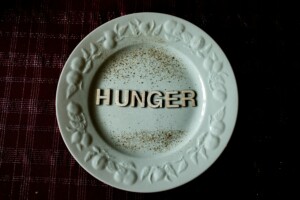The Human Experience of Hunger
 We all hunger. It’s part of our human condition. There is something good about it; being human is possessing this bodily message that reminds us we lack something. It tells us that we depend on something outside of ourselves biologically, socially, and spiritually. And as society continues to push us further into isolation and self-sufficiency, it is no wonder that our sense of longing grows. This longing grows in tandem with our unprecedented capacity to meet and fill (or numb) any desire. You might say to be human is to be hungry, to feel the incessant desires for fulfillment pressed upon us. Yet, to remain human while being hungry is a spiritual journey. To keep our desires from distorting our humanity is a spiritual journey. This spiritual journey brings us closer to our yearnings and the reality that we cannot meet them on our own.
We all hunger. It’s part of our human condition. There is something good about it; being human is possessing this bodily message that reminds us we lack something. It tells us that we depend on something outside of ourselves biologically, socially, and spiritually. And as society continues to push us further into isolation and self-sufficiency, it is no wonder that our sense of longing grows. This longing grows in tandem with our unprecedented capacity to meet and fill (or numb) any desire. You might say to be human is to be hungry, to feel the incessant desires for fulfillment pressed upon us. Yet, to remain human while being hungry is a spiritual journey. To keep our desires from distorting our humanity is a spiritual journey. This spiritual journey brings us closer to our yearnings and the reality that we cannot meet them on our own.
And yet, I’m uncomfortably aware that while reading about the poetic, interdependent beauty of hunger there is another harsh reality. Many of our brothers and sisters are starving; their bodies lack nourishment.
The Spiritual Implications of Hunger
I appreciate the jarring juxtaposition of Matthew and Luke’s versions of the Beatitudes. Matthew gives a spiritual twist to Jesus’ words regarding hunger: “Blessed are those who hunger and thirst for righteousness, for they will be filled” (Matthew 5:6). We who have the luxury of satiating our hunger are responsible for fashioning our desires into the means that please God—we should be hungry for justice and righteousness.
Luke’s version is more grounded and earthlier: “Woe to you who are full now, for you will be hungry” (Luke 6:25). Decisive and damning, this author, a physician who tended to the reality of bodies, distinguished between the haves and the have-nots. Together, Matthew and Luke present the holistic vision of Jesus’ ministry that sought to transform humankind’s spiritual and physical conditions.
Preparation for Lent
As we enter the season of Lent, we prepare for a season in which we further align our longings with the longings of God. That is why I’ve decided to “take up” practices that fuel my own longing for God and God’s ways. Rather than giving up chocolate or coffee, I seek to go deeper into my solidarity with those who hunger, precisely by going deeper into my desires: Desires of my flesh, felt when paying attention to how my hands mold clay that I prayerfully cast. Desires of justice, informed by staying up to date with what our lawmakers are doing. Desires for God, kindled by surrounding myself with voices that light the fire of God within me.
Blessed are those who hunger.

